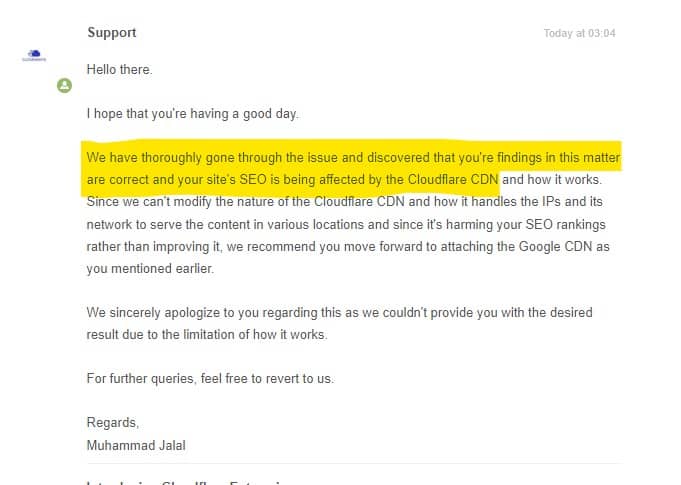Blogs
Is Cloudflare Bad for SEO? According to a big webhosting company it is!

Everywhere you turn, Cloudflare comes highly recommended. It almost feels like a no-brainer to link your website to Cloudflare, especially with all the rave reviews it gets. I mean, who wouldn't want a lightning-fast website shielded from DDoS attacks? But after months of hard work and countless blog posts, instead of seeing growth, you notice a dip in your organic traffic. It's easy to point fingers everywhere but at Cloudflare. But before you know it, you're left wondering, is Cloudflare bad for SEO?
Well, it's a bit of a mixed bag. While Cloudflare offers some fantastic features like speed and DDoS protection, there have been instances where it's impacted organic traffic. In fact, Cloudways conducted an investigation into this very issue and found that, for some websites, Cloudflare did have a negative effect on SEO. So, while it might be a game-changer for many, it's essential to monitor your site's performance and make sure it's the right fit for you.
Hey there, fellow web enthusiast! So, you've probably heard the buzz about Cloudflare, right? It promises faster website speeds, top-notch security, and protection from those pesky DDoS attacks. But here's the kicker: whispers are circulating that it might be a bit of an SEO party pooper. Shocking, I know! But before we jump to conclusions, let's dive deep and see if there's any truth to the claim: Is Cloudflare bad for SEO? Stick around, and we'll unravel this mystery together.
The Buzz Around Cloudflare
Alright, let's get into it! So, Cloudflare has been making waves in the digital world, and if you're even a tad bit involved in website management, you've likely heard its name thrown around. But what's all the fuss about? At its core, Cloudflare is this nifty web infrastructure and website security company.
Everyone's buzzing about it because it's like that multi-talented friend we all wish we had. First, it promises to turbocharge your website speed, making those annoying loading circles a thing of the past. Then, there's the security aspect – it's like a digital bodyguard, keeping the bad guys at bay. And let's not forget its claim to fame: DDoS protection. In a world where cyber-attacks are as common as morning coffee, having that shield is a big deal.
So, on paper, Cloudflare seems like the dream, but is it too good to be true for SEO? Let's find out.
My Personal Experience: A Rollercoaster Ride
Oh boy, where do I begin? So, like many of you, I was super pumped to jump aboard the Cloudflare express. I mean, who wouldn't be? With all the rave reviews and promises of blazing fast website speeds, it felt like I was about to unlock a secret level in the game of web management.
I poured my heart and soul into my site, tweaking here, optimizing there, and churning out content like there was no tomorrow. I was all set, waiting for that sweet influx of traffic. But days turned into weeks, and instead of seeing those numbers climb, I was left scratching my head, thinking, “Where's everyone at?”
And then, the gut punch. My organic traffic, which was once my pride and joy, began to wane. It was like watching your favorite plant wither despite watering it diligently. Every time I checked my analytics, that sinking feeling grew. The numbers didn't lie; my organic visits were on a downward spiral.
Could Cloudflare, the very tool I adopted to boost my site, be the culprit behind this SEO hiccup? The plot thickened, and I was determined to get to the bottom of it.
Not Just Me: The Lions Ground Story
Now, let's get personal. My own platform, Lions Ground, had a tale that mirrored many others, but with its own unique twists and turns. We'd been using Cloudflare for what felt like ages. Everything seemed smooth until April 12, 2023. That day, the Google Search Console threw a curveball: our search impressions took a nosedive.
For context, with Cloudflare in the picture, Lions Ground was averaging a modest 20 impressions per day on Google. Not terrible, but incredible disastrous. However, after some detective work and stumbling upon a revealing article, I grew suspicious. Could Cloudflare be the silent traffic thief?
Deciding to test this theory, I pulled the plug on Cloudflare on August 24th. The results were nothing short of astonishing. By the 27th, Lions Ground's impressions skyrocketed to 299. And then, the grand finale: on August 28th, the site exploded with a whopping 931 impressions in a single day!
This wasn't just a fluke. It was a clear sign pointing to Cloudflare's impact on our SEO. The numbers spoke louder than words, and the realization hit hard.

The Cloudways Investigation: An Eye-Opener
Cloudflare Enterprise isn't just any service; it's a standout offering from Cloudways, boasting features that promise unparalleled speed and security. So, imagine my surprise when my SEO metrics started to dip.
When Cloudways delved into the matter, their words were clear and concerning: “We have thoroughly gone through the issue and discovered that your findings in this matter are correct and your site's SEO is being affected by the Cloudflare CDN and how it works.”
This confirmation was a wake-up call. The technical side of things suggests that Cloudflare, despite its many advantages, might have certain elements that don't gel well with SEO. It's about its IP handling, content delivery, and possibly other factors we're yet to uncover.
If you're eyeing Cloudflare Enterprise on Cloudways, it's worth taking a pause and understanding its full impact. Because, at the end of the day, no one wants to trade off their SEO.

Can Cloudflare Actually Hurt Your Website's SEO?
While I was grappling with the unexpected drop in organic traffic on my website, I chanced upon a case study on ServerGuy that delved into the potential SEO implications of using Cloudflare. The insights were quite revealing.
The case study detailed the journey of a website that, much like mine, saw a decline in organic traffic post its Cloudflare integration. Intrigued, the ServerGuy team dug deeper. They discovered that the website's server response time had shot up after the move to Cloudflare. To put it in perspective: “After moving to Cloudflare, the server response time of the website increased from 300ms to 1200ms.” That's quite the jump! And as many of us know, a prolonged server response time can be detrimental to SEO.
It was Cloudflare all along. 2 years, I been trying hard for 2 years what was wrong with my SEO and its all just because of Cloudflare. From top first page to non existent in SERP. After removing Cloudflare my sites seo rank is recovering.
says Elrond the Wanderer.
But that wasn't the end of it. The website's TTFB (Time to First Byte) also saw an increase. TTFB measures the duration the server takes to send the first byte of data after receiving a request. A high TTFB can be another nail in the SEO coffin.
To get a broader perspective, I looked at the comments on the case study. One by “Tony Levensen” particularly resonated with me. He shared, “I think so. I have 2 websites. first website have using the Cloudflare and second website don't. I can see that my first website ranking is a little suck even I did the same SEO technical with both sites.”
This case study was a revelation. If you're contemplating Cloudflare integration, it's crucial to be aware of these potential pitfalls and keep a close watch on your site's performance metrics.
What's Next? Making Informed Decisions
So, the big question: Should you give Cloudflare the boot? For me, the answer was clear. I've always believed in letting the numbers do the talking, and boy, did they speak volumes this time. The numbers shouted a resounding “YES.”
Now, I'm not one to sit and dwell. I'm already setting my sights on a new horizon: Google's Cloud CDN. It promises efficiency, and I'm eager to see if it delivers on that promise.
But here's a piece of advice from someone who's been through the wringer: Always, always keep a close watch on your metrics. They're like the pulse of your website, giving you real-time feedback on its health. And remember, it's not just about following trends or what everyone else is doing. It's about understanding what truly works for your site.
In the ever-evolving world of SEO, staying informed and making data-driven decisions is the key. Don't let one setback deter you. Learn, adapt, and keep pushing forward.
Is Cloudflare Bad For SEO?
Is Cloudflare a boon or a bane for SEO? For me, yes, Cloudflare was bad for websites. Hosting four websites, I witnessed firsthand how each one faced the brunt of Cloudflare's impact on SEO. It's a tale of caution, urging us to tread carefully in the digital realm.














